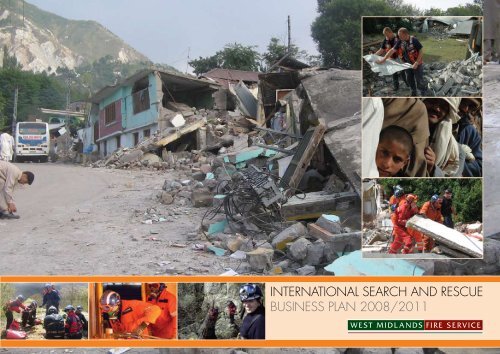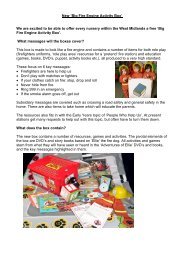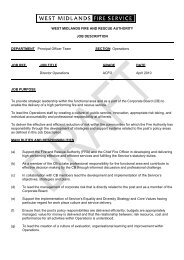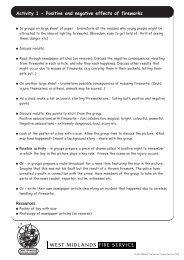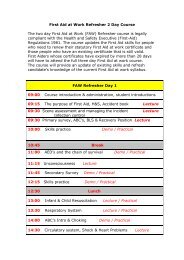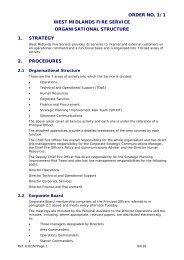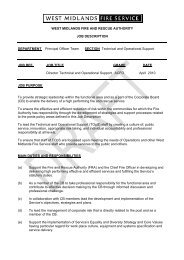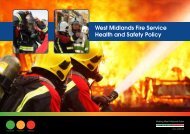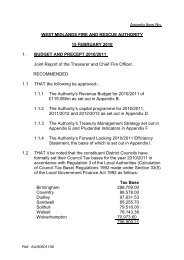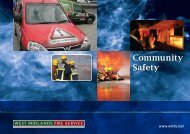ISAR Business Plan 2008/11 - West Midlands Fire Service
ISAR Business Plan 2008/11 - West Midlands Fire Service
ISAR Business Plan 2008/11 - West Midlands Fire Service
You also want an ePaper? Increase the reach of your titles
YUMPU automatically turns print PDFs into web optimized ePapers that Google loves.
INTERNATIONAL SEARCH AND RESCUE<br />
BUSINESS PLAN <strong>2008</strong>/20<strong>11</strong>
2 <strong>ISAR</strong> BUSINESS PLAN<br />
The Mission Statement:<br />
“Our Mission is to provide a professional,<br />
effective and efficient response to<br />
International and UK Disasters on behalf of the<br />
Government of the United Kingdom”
INTERNATIONAL SEARCH AND RESCUE<br />
3 YEAR BUSINESS PLAN<br />
<strong>ISAR</strong> BUSINESS PLAN 3<br />
Contents:<br />
Foreword by Chief <strong>Fire</strong> Officer 4<br />
Introduction by WMFS <strong>ISAR</strong> Commander 5<br />
WMFS <strong>ISAR</strong> Team Structure 6<br />
National Governance Arrangements 7<br />
National Mobilising Arrangements 8<br />
UK <strong>ISAR</strong> Deployments 9<br />
Deployments 10<br />
Tanzania Capacity Building <strong>11</strong><br />
Kashmir Earthquake 12<br />
Pakistan Capacity Building 13<br />
Birmingham Tornado 14<br />
Training Standards 15<br />
Core Skills Modules 16<br />
Specialist Skills Modules 17<br />
Maintenance of Competence Training 18<br />
Organisational Benefits 19<br />
Financial Resourcing 20<br />
3 Year <strong>Plan</strong> 22<br />
5 Year Aspirations 23<br />
<strong>ISAR</strong> Adopted Charity 25<br />
Notes 25
4 <strong>ISAR</strong> BUSINESS PLAN<br />
Foreword from the Chief <strong>Fire</strong> Officer: Developing the International Search and Rescue Team’s <strong>Business</strong> <strong>Plan</strong>.<br />
Vij Randeniya<br />
OBE MA BA(Hons) MI<strong>Fire</strong>E<br />
Chief <strong>Fire</strong> Officer<br />
<strong>West</strong> <strong>Midlands</strong> <strong>Fire</strong> <strong>Service</strong><br />
The <strong>West</strong> <strong>Midlands</strong> <strong>Fire</strong> <strong>Service</strong> has been an integral part of the UK Government’s response to overseas disasters<br />
since the inception of the United Kingdom <strong>Fire</strong> <strong>Service</strong> Search and Rescue Team (UKFSSART) in 1991. During its<br />
17 year history the team has grown in experience and developed in capability to that of a highly skilled, well<br />
motivated, resourceful and dedicated group of firefighters who have repeatedly demonstrated their ability to<br />
deploy at short notice to some of the worlds worst disasters. This was most evident during their latest deployment<br />
to the earthquake in Kashmir, where their achievements were internationally acclaimed.<br />
I am immensely proud of our teams’ achievements and am similarly supportive of their aspirations for future<br />
development. I wholeheartedly support and endorse their professionalism and accomplishments and I am also<br />
grateful for their efforts in acquiring and maintaining the competencies required for inclusion and membership<br />
within the United Nation’s Heavy Rescue Response. Additionally, <strong>West</strong> <strong>Midlands</strong> <strong>Fire</strong> Control has embraced the<br />
challenge of joint responsibility with Hampshire FRS for the mobilisation of the UK International Search<br />
and Rescue.<br />
I also endorse the teams intention to build upon our partnerships across the world and continue to strengthen<br />
capacity building operations in less developed countries and with organisations such as Swedish Rescue<br />
<strong>Service</strong>s Agency (SRSA) and Department for International Development (DFID) in a bid to optimise our resources<br />
and maximise our joint capabilities. This also aligns with the DFIDs aim of “Improving the quality of European<br />
Community development and humanitarian assistance through reforms and capacity building”.<br />
It is encouraging to view the governments’ recent changes to mobilising protocols surrounding the UK response<br />
within the United Nations and the European Community Mechanism as a unified deliverance of emergency aid.<br />
I am entirely confident that you will witness the continued growth and consolidation of the teams standing within<br />
the International theatre of operations, as they continue to take leading roles within the UK International Search<br />
and Rescue structure, for which we can all be justifiably proud.
Introduction - <strong>ISAR</strong> Commander<br />
I am delighted to introduce the strategic business plan for the <strong>West</strong> <strong>Midlands</strong> International Search and<br />
Rescue (<strong>ISAR</strong>) team <strong>2008</strong> – 20<strong>11</strong>.<br />
The <strong>West</strong> <strong>Midlands</strong> team is part of the wider UK-<strong>ISAR</strong> team which is dedicated to the provision of a<br />
professional and effective response capability on behalf of the UK government to disasters all over the world.<br />
I am proud to say that our team members are exceptional in their commitment, professionalism and<br />
dedication to the team and the roles we are required to undertake. This level of excellence doesn’t just<br />
happen; the team leaders pride themselves in the extensive and painstaking selection process that we<br />
put all of our personnel through in order that we only select the best of the best.<br />
Primarily our role is that of Search and Rescue in collapsed structures; however, the <strong>West</strong> <strong>Midlands</strong> team has<br />
also invested a great deal financially and in training to develop a Command and Control capability that is<br />
second to none, which will support the full UK-<strong>ISAR</strong> team when deployed. We recognise the need to keep<br />
ahead of the changing face of disasters and for that reason we have and will develop further our skills in<br />
Rope Rescue, Water Rescue, and Wide Area Search.<br />
As a team we believe in cascading to others the skills that we have acquired and we will continue to do this,<br />
especially in those areas of the world that will benefit most. We have and will continue to achieve this by<br />
working in partnership with other influential international organisations as this is not only more efficient but<br />
also more effective in achieving the overall objective.<br />
<strong>ISAR</strong> BUSINESS PLAN 5<br />
Alan Pellowe<br />
<strong>ISAR</strong> Commander<br />
<strong>West</strong> <strong>Midlands</strong>
6 <strong>ISAR</strong> BUSINESS PLAN<br />
<strong>ISAR</strong> Commander - <strong>West</strong> <strong>Midlands</strong><br />
Alan Pellowe<br />
Birmingham
National Governance arrangements<br />
Brief History<br />
Communities and Local Government, Department for International Development and the Cabinet Office are fully committed<br />
to providing an emergency response to both man made and natural disasters that may occur within the European Union and<br />
to the rest of the world. As a consequence HM <strong>Fire</strong> <strong>Service</strong>s Inspectorate was asked to establish a team with the capability of<br />
responding to and managing all anticipated catastrophic events.<br />
A letter to the Chief Officer dated 9/1992, laid out the arrangements for the establishment of this team and as a consequence a<br />
Memorandum of Understanding (MOU) was signed by the CFO on behalf of the <strong>Fire</strong> Authority giving a commitment to becoming<br />
a member of the United Kingdoms <strong>Fire</strong> <strong>Service</strong>s Search and Rescue team (UKFSSART). Since the conception of the team in 1993<br />
there have been many changes at the strategic level to the national and international structures; however WMFS has always<br />
remained committed to providing a team capable of “providing humanitarian assistance to international communities”.<br />
Governance<br />
A recent change to the national structure now means that we have a CFOA lead responsible for UK <strong>Fire</strong> <strong>Service</strong>s overseas<br />
operations. Currently this position is held by CFO Mike Thomas from Lincolnshire FRS, who also represents <strong>ISAR</strong> on the<br />
national USAR User Group and feeds information back to individual Chief <strong>Fire</strong> Officers on:<br />
• operational standards<br />
• competency requirements<br />
• equipment compatibility<br />
• administrative arrangements<br />
• insurance provisions<br />
• health and safety management<br />
• equality protocols<br />
• records and audit systems.<br />
It is clear that these arrangements will provide a stable footing on which we can progress<br />
<strong>ISAR</strong> for the future and limit any risks or liability. The diagram on the next page explains how<br />
the full national structure is arranged:<br />
<strong>ISAR</strong> BUSINESS PLAN 7
8 <strong>ISAR</strong> BUSINESS PLAN<br />
<strong>West</strong> <strong>Midlands</strong><br />
<strong>Fire</strong> and Rescue<br />
Authority<br />
WMFS CFO<br />
WMFS <strong>ISAR</strong><br />
National<br />
USAR<br />
Working Group<br />
USAR<br />
Technical Leads<br />
Manager
National Mobilising Arrangements<br />
<strong>ISAR</strong> BUSINESS PLAN 9<br />
<strong>ISAR</strong> comprises of selected personnel from 13 FRS and responds to International Incidents under the auspices of the Department for<br />
International Development (DFID) and the European Union Civil Protection Mechanism. To ensure that we are able to meet with the<br />
mobilising requirements of both DFID and the EU, UK <strong>ISAR</strong> has put in place standards that all FRS teams will comply with:<br />
1. Maintenance of an immediate communication capability.<br />
2. All UK-<strong>ISAR</strong> teams 24 hour contact details are held by the resource and mobilising centre.<br />
3. On receipt of a mobilisation, WMFS will make available one team of 6 personnel led by a Team leader for Command<br />
Support duties and second team of 6 personnel when on call for Search & Rescue duties. The <strong>West</strong> <strong>Midlands</strong> command<br />
support team will deploy on every UK deployment.<br />
4. Deployment of sufficient equipment to be able to undertake command support duties for the UK team, and be prepared<br />
to undertake duties as per INSARAG guidelines.<br />
5. All personnel must have a passport valid for a minimum of 6 months.<br />
6. All personnel mobilised must possess the required skills and be competent to perform heavy USAR operations.<br />
7. All personnel must be inoculated the required standards and carry an up to date vaccination record.<br />
8. All personnel must have appropriate and sufficient PPE, both for USAR operations and the environment encountered<br />
during deployment.<br />
9. Ensure that the team can be transported to the point of departure within 6 hours of the mobilisation alert.<br />
10. Be self-sufficient for a minimum of 10 days (shelter, food, water and sanitation).<br />
Mobilisation of <strong>ISAR</strong> will be carried out by the national mobilising centre, which is a shared responsibility between Hampshire<br />
FRS and <strong>West</strong> <strong>Midlands</strong> FRS who will undertake all arrangements for mobilisation of the UK team and act as a communications hub<br />
for all overseas deployments. This arrangement provides a robust approach to UK mobilisation.
10 <strong>ISAR</strong> BUSINESS PLAN<br />
UK - <strong>ISAR</strong> Deployments<br />
YEAR AREA TYPE OF RESPONSE <strong>West</strong> <strong>Midlands</strong> within UK<br />
Response<br />
1995 Romania Capacity Building <strong>West</strong> <strong>Midlands</strong> only response<br />
1996 Romania Capacity Building <strong>West</strong> <strong>Midlands</strong> only response<br />
1996 Bosnia Capacity Building Yes<br />
1996 Montserrat, Caribbean Capacity Building No<br />
1997 Montserrat, Caribbean Capacity Building No<br />
1999 Skopje, Macedonia Humanitarian response Yes<br />
1999 Izmit, Turkey Earthquake Yes<br />
1999 Duzce, Turkey Earthquake Yes<br />
2000 Mozambique Flooding No<br />
2001 Bhuj, Gujarat province, India Earthquake No<br />
2003 Bourmerdes region, Algeria Earthquake No<br />
2003 Bam, Iran Earthquake No<br />
2004 Khoa Lak area, Thailand Tsunami No<br />
2005 Birmingham, UK Tornado <strong>West</strong> <strong>Midlands</strong> only response<br />
2005 Muzaffarabad, Pakistan Earthquake Yes<br />
2005 Poland European Exercise Yes<br />
2007 Tanzania Dar Es Salaam Capacity Building <strong>West</strong> <strong>Midlands</strong> only response<br />
2007 Texas, United States of America Hurricane Dean Yes<br />
<strong>2008</strong> Islamabad – Pakistan Capacity Building Yes<br />
<strong>2008</strong> Tanzania Dar Es Salaam Capacity Building <strong>West</strong> <strong>Midlands</strong> only response
PRESS STATEMENT - Thursday, January 4, 2007<br />
SEARCH AND RESCUE TEAM TO TRAIN COLLEAGUES IN AFRICA<br />
A team of Search and Rescue experts from <strong>West</strong> <strong>Midlands</strong> <strong>Fire</strong> <strong>Service</strong> travelled to the African<br />
country of Tanzania to train its firefighters in vital life-saving techniques. Six members of the UK<br />
International Search and Rescue Team (<strong>ISAR</strong>) spent two weeks there providing basic training<br />
in skills such as water rescue, high angle line rescue and technical search following structural<br />
collapse. During the trip they conducted a number of exercises with members of the Urban<br />
Search and Rescue team based in the city of Dar es Salaam to demonstrate and test the skills<br />
they have shared.<br />
Paul Burnham said “<strong>West</strong> <strong>Midlands</strong> <strong>Fire</strong> <strong>Service</strong> is leading the way with search and rescue and<br />
we are very pleased to have this exciting opportunity to share our skills and techniques with our<br />
colleagues in Tanzania. We hope that our visit will leave them better prepared to face a wide<br />
variety of scenarios that can occur.”<br />
The team who travelled to Tanzania consisted of Team Leader Alan Pellowe (Birmingham), Paul<br />
Burnham (Coventry), Alan Batchelor and James McParland (Training Centre), Lee Ivory (Solihull),<br />
and David Moffat (Erdington). They are all serving firefighters with <strong>West</strong> <strong>Midlands</strong> <strong>Fire</strong> <strong>Service</strong>.<br />
Deputy Chief <strong>Fire</strong> Officer Vij Randeniya<br />
“I was fortunate to join our team midway through their programme and was able to see first<br />
hand the impact that we were having. The training programme delivered by <strong>West</strong> <strong>Midlands</strong> <strong>Fire</strong><br />
<strong>Service</strong> personnel via <strong>ISAR</strong>, quite simply, made a difference to many people’s lives and they can<br />
be justly proud of what they achieved. “While it may appear strange that we were there helping<br />
a private fire brigade funded by subscriptions, I was struck by the thought that if we weren’t<br />
there, no-one else would be and our involvement greatly benefited the people of<br />
Dar es Salaam.”<br />
<strong>ISAR</strong> BUSINESS PLAN <strong>11</strong>
12 <strong>ISAR</strong> BUSINESS PLAN<br />
PRESS STATEMENT<br />
LATEST UPDATES FROM WEST MIDLANDS RESCUERS IN KASHMIR<br />
Alan Pellowe, Pete Mills, Phil Webb, Stuart Downes and Paul Jobbins were mobilised within<br />
hours of the earthquake happening and travelled to Islamabad, from where they were<br />
helicoptered into the very heart of the trauma – Muzaffarabad – the epicentre of the earthquake.<br />
The team were part of the UK contingent of eighty personnel who assisted in the rescue of<br />
24 people trapped under rubble, as well as co-ordinating all the international rescue teams out<br />
in Muzaffarabad, for the UN.<br />
Pete Mills and Stuart Downes were responsible for the initiative which helped to save 800<br />
casualties from nearby towns after co-ordinating the German Airforce to send helicopters into<br />
areas that hadn’t received any help for five days since the earthquake struck. These were people<br />
who would have died from their injuries.<br />
Speaking live from Muzaffarabad, Alan Pellowe told <strong>Fire</strong>power that the team had been<br />
working 21-hour days with little more than three hours sleep every night and had been subject<br />
to after-shocks most nights.<br />
He said: “It has taken a huge toll on all of us physically and emotionally but we are all working<br />
well together and supporting each other. The sights the members have been exposed to are<br />
horrific. We are all experienced firefighters and have seen a lot in our lives already but nothing<br />
on this scale.”<br />
The team finally returned home to Birmingham International Airport where they were greeted by<br />
their families, fellow colleagues of the team, as well as councillors and representatives from the<br />
Birmingham communities who had lost relatives in the earthquake zone and the media.
PRESS STATEMENT<br />
USAR CAPABILITY BUILDING IN PAKISTAN<br />
<strong>ISAR</strong> BUSINESS PLAN 13<br />
From the 3rd to the 18th May <strong>2008</strong>, Jim McParland and Rob Norman from <strong>West</strong> <strong>Midlands</strong><br />
<strong>Fire</strong> <strong>Service</strong> were deployed to support an international project to develop an Urban Search<br />
and Rescue capability in Pakistan. The project is part of a 3 year plan organised by the<br />
Swedish Rescue <strong>Service</strong> Agency (SRSA) as an outcome from the report that identified a lack<br />
of these skills within Pakistan during the Kashmir earthquake in 2005.<br />
It involves setting up, training and equipping 3 heavy USAR teams in Islamabad, Karachi,<br />
and Lahore. The SRSA contacted Dave Dickson UK co-ordinator for UKFSSART with a<br />
request for qualified instructors in rope rescue and timber shoring and applications were<br />
asked for from members of the national UKFSSART teams.<br />
Jim and Rob are both members of <strong>West</strong> <strong>Midlands</strong> UK <strong>Fire</strong> <strong>Service</strong>s Search and Rescue Team<br />
that were deployed to the earthquake in 2005 and were selected along with John McKie<br />
from Lancashire and Neil Graham from <strong>West</strong> Sussex. Jim was nominated to lead the team<br />
and was supported by project co-ordinators here in the UK.<br />
Over a 2 week period 20 members of Islamabad’s Technical Rescue Team were trained<br />
and assessed in rope rescue and timber shoring and given the equipment with an ongoing<br />
training plan to maintain their skills. UKFSSART nationally is committed to supporting the<br />
SRSA over the coming years in the further development of this project.<br />
Despite all the problems initially encountered, i.e. lost luggage, equipment stuck at customs,<br />
security restrictions on travelling anywhere other than place of work and accommodation,<br />
40°C plus heat, the trip was an overwhelming success and went a long way to establishing<br />
a solid foundation for USAR to be conceived in Pakistan.
14 <strong>ISAR</strong> BUSINESS PLAN<br />
PRESS STATEMENT – 29 July 2005 <strong>11</strong>:25 Hours<br />
ATTENDANCE AT BIRMINGHAM TORNADO<br />
The <strong>ISAR</strong> team was mobilised on 28th July 2005, to a tornado which struck the Kings Heath,<br />
Moseley, Balsall Heath, Sparkbrook and Small Heath districts of the City. This incident was<br />
declared a major emergency due to the extent and scale of the damage and the number of<br />
local communities directly involved.<br />
<strong>ISAR</strong> were mobilised from the base at Solihull <strong>Fire</strong> Station and were in attendance at the scene<br />
within 90 minutes of the call. They arrived with a cache of specialist heavy rescue equipment<br />
and a team of experts who had extensive previous experience of dealing with the aftermath of<br />
earthquakes and other natural disasters. The team found extensive and widespread damage<br />
to buildings, vehicles and trees and experienced extreme difficulty accessing the site. They<br />
were, however, able to offer very quick assistance to the Incident Commander and started to<br />
systematically search the buildings for any trapped members of the local community. With such<br />
a large area of operations and due to the perilous nature of some of the buildings, a specialist<br />
canine search team was mobilised from Merseyside and Mid Wales to assist in the search.<br />
The team formed an integral part of the emergency response and was able to provide<br />
assistance and guidance to the crews in attendance in relation to the risks posed by the partially<br />
collapsed structures and liaise with the City Council dangerous buildings team to agree joint<br />
risk assessments of the site.<br />
The team remained at the scene well into the evening, having searched the houses in more than<br />
thirty streets and roads, no one was found to be trapped, although a number of people were<br />
injured by flying debris.
Training Standards<br />
One of the underlying principals of the International Search and<br />
Rescue (<strong>ISAR</strong>) team is that personnel responding to catastrophic<br />
incidents overseas having received the same training and will do<br />
so using identical equipment, systems of work and procedures.<br />
This principle and the understanding and inter-operability that result,<br />
will be achieved by adherence to nationally agreed training and<br />
development standards. All <strong>Fire</strong> and Rescue <strong>Service</strong>s forming part of<br />
the International Search and Rescue team are required to plan and<br />
deliver search and rescue training as per these standards.<br />
The standards will describe in detail the skills and knowledge<br />
considered necessary to perform the various roles within the <strong>ISAR</strong><br />
team and will be linked to the National Occupational Standard<br />
(Role Map) for <strong>Fire</strong>fighters.<br />
It is against these performance criteria that an individual’s current<br />
skills and knowledge will be assessed, in order to determine the<br />
presence or otherwise of any skills gaps. It is to meet the identified<br />
skills gaps that specific and relevant learning opportunities will<br />
need to be developed and this learning will be adopted on a local,<br />
national or international basis.<br />
<strong>ISAR</strong> responders will be required to complete a range of training<br />
modules in a sequential process, commencing with core skills and<br />
progressing onto specialist skills. Team members will need to complete<br />
all of the core skills in order to respond overseas.<br />
<strong>ISAR</strong> BUSINESS PLAN 15
16 <strong>ISAR</strong> BUSINESS PLAN<br />
Core Skills Modules<br />
There are ten core skills training modules that have been designed to<br />
give personnel the underpinning practical and technical knowledge<br />
required to safely operate equipment carried within the <strong>ISAR</strong> inventory.<br />
These include:<br />
International USAR Operations<br />
Base of Operations<br />
Reconnaissance and Survey<br />
Technical Search Operations<br />
Breaking and Breeching<br />
Rigging and Lifting<br />
Shoring<br />
Confined space<br />
Safe working at height<br />
Water awareness<br />
Completion of all modules at approved training providers will allow<br />
personnel to be accredited with the “<strong>ISAR</strong> Technician” qualification.
Specialist Skills Modules<br />
The specialist skills training modules are designed to provide<br />
individuals within <strong>ISAR</strong> teams with the full range of specialist skills and<br />
knowledge required at disasters overseas. These training modules will<br />
be delivered by a number of approved training providers, but may<br />
also be completed within respective FRS. Modules are currently being<br />
developed in the following areas:<br />
Casualty care Hot cutting<br />
Flood and swift water response Wide area search operations<br />
Rope rescue Hazmat /CCBRN<br />
Water craft Shoring (advanced)<br />
Canine Media<br />
Logistics Command and communication<br />
Chainsaw operations Structural collapse assessment<br />
<strong>ISAR</strong> BUSINESS PLAN 17
18 <strong>ISAR</strong> BUSINESS PLAN<br />
Recording of<br />
Competencies<br />
WMFS <strong>ISAR</strong> will be working<br />
towards introducing an ICT<br />
based system for the purpose<br />
of recording training and the<br />
maintenance of competence<br />
against the recognised<br />
National Standards. This<br />
will also involve carrying<br />
out workplace assessments<br />
measured against a set<br />
of National Occupational<br />
standards.<br />
Maintenance of Competence Training<br />
The complexity and extent of some of the content of the <strong>ISAR</strong> training<br />
modules being delivered (and yet to be developed), will undoubtedly<br />
mean that demands from individuals for Maintenance Of Competence<br />
training (MOC) will be significant.<br />
In order to maintain the competencies of the <strong>ISAR</strong> teams, national<br />
standards have been established that will enable teams and individuals<br />
to clearly demonstrate their competency and, as importantly, measure<br />
improvements or skill fade in a repeatable and consistent manner.<br />
The maintenance of national standards and the provision of <strong>ISAR</strong><br />
training across the country needs to be supported by the use of the<br />
equipment and training facilities provided by the New Dimension<br />
programme, so consequently, alignment with the Technical Rescue Unit<br />
training plan is crucial to the success of our development programmes.
Organisational Benefits<br />
<strong>ISAR</strong> BUSINESS PLAN 19<br />
During the past decade, structural collapses caused by earthquakes have resulted in over 100,000 deaths worldwide. While the majority of<br />
the survivors of these events are found and extricated quickly, some are subjected to prolonged periods of entrapment before they are rescued.<br />
Most of these events take place in countries that are less able to cope with the huge demands placed upon the local emergency services<br />
and request international assistance to locate and extricate these unfortunate individuals. Since 1991 the United Kingdom Government has<br />
relied upon the <strong>Fire</strong> <strong>Service</strong> to respond to and manage these types of incidents. For the <strong>Fire</strong> <strong>Service</strong> this has resulted in many individual and<br />
organisational benefits which we have summarised below:<br />
WMFS team learn about different cultures, customs and practices, establishing effective ways in which to communicate and<br />
overcome difficulties.<br />
They are exposed to the frustrations and restrictions that apply to working in these environments and consequently develop<br />
methods to improvise and adapt working practices in order to achieve their aims.<br />
All of the experience and skills learnt from dealing with these major international disasters are transferable and have been used<br />
to benefit the communities of the <strong>West</strong> <strong>Midlands</strong> in both emergency response and through community activity and initiatives.<br />
When we travel overseas to deliver training, we can take satisfaction in developing Emergency <strong>Service</strong>s of other countries that<br />
do not have the infrastructure, capability or resources to keep their people safe from challenging incidents.<br />
We believe that our local ethnic communities within the <strong>West</strong> <strong>Midlands</strong> are reassured and proud that we are supporting the relief<br />
effort in their homelands.<br />
As a team, we deliver a positive image of the organisation through huge media exposure, when we deploy and on the wider<br />
political front, we fly the flag for the United Kingdom; we show that we are a country that cares for others.<br />
The <strong>ISAR</strong> team provides an additional specialist resource to the WMFS and the Region. The WMFS <strong>ISAR</strong> team has recently been<br />
included within the National Data Base for major incidents involving water.<br />
Ultimately, we believe that when we respond overseas and save human life, it is worth all of the personal sacrifice and effort to<br />
be an <strong>ISAR</strong> team member and a member of <strong>West</strong> <strong>Midlands</strong> <strong>Fire</strong> <strong>Service</strong>.
20 <strong>ISAR</strong> BUSINESS PLAN<br />
Financial Resourcing<br />
Purpose Cost Recovery Source Amount<br />
Capacity Building in Pakistan Full SRSA £6,500<br />
Earthquake response to Kashmir Full DFID £20,000<br />
Capacity Building in East Africa Matched funding Knight Support £6,000 per annum<br />
National Training Exercises Full DFID £2,500 per annum<br />
Vaccinations and Inoculations Full DFID £2,800<br />
Clothing and PPE Within existing budget WMFS £6,500 per annum<br />
Maintenance of Competence Within existing budget WMFS £3,000 per annum<br />
Command and Control equipment<br />
procurement<br />
Full<br />
DFID development<br />
bid<br />
£9,000<br />
Equipment Within existing budget WMFS £5,000 per annum
20%<br />
10%<br />
£14,500<br />
£6,000<br />
Financial Resourcing %<br />
� Full recovery<br />
� Matched funding<br />
� Within existing budget<br />
70%<br />
� Full recovery<br />
� Matched funding<br />
� Within existing budget<br />
£40,800<br />
<strong>ISAR</strong> BUSINESS PLAN 21<br />
Financial Aspiration Opportunities<br />
DFID<br />
The Department for International Development has committed to<br />
funding <strong>ISAR</strong> for the next 3 years at £80,000 per year. Mainly this<br />
will cover the costs of training and National Exercises.<br />
DFID also provides funding for capacity building in under<br />
developed areas around the world.<br />
United Nations<br />
Currently the United Nations financially support the cost associated<br />
with disaster training. Our intention is to develop this arrangement<br />
to include wider opportunities.<br />
European Union<br />
We will apply for funding in line with the European Mechanism<br />
to facilitate EU disaster assessment and management courses.<br />
We will also apply for funding to assist EU’s programme to aid<br />
capacity building in impoverished areas around the world.
22 <strong>ISAR</strong> BUSINESS PLAN<br />
3 Year <strong>Business</strong> <strong>Plan</strong><br />
<strong>2008</strong> 2009 2010
5 Year Aspirations<br />
<strong>ISAR</strong> BUSINESS PLAN 23<br />
<strong>2008</strong> 2009 2010 20<strong>11</strong> 2012 2013
24 <strong>ISAR</strong> BUSINESS PLAN<br />
5 Year Aspirations - continued<br />
<strong>2008</strong> 2009 2010 20<strong>11</strong> 2012 2013
WMFS – <strong>ISAR</strong> Adopted Charity Notes<br />
During our first visit to Tanzania, the <strong>West</strong> <strong>Midlands</strong> <strong>ISAR</strong> team<br />
were humbled by a group of kids living a very basic existence in<br />
a Salvation Army Orphanage on the outskirts of Dar Es Salaam.<br />
The laughter displayed and the hope shown by these children in<br />
support for each other, in spite of the fact that many were missing<br />
arms and legs and countless numbers having been terribly deformed<br />
through rickets, led us to adopt this as our preferred charity.<br />
The team takes every opportunity to raise funds or provide prosthetics<br />
in a bid to improve the lives of these young people.<br />
Donations can be sent to:<br />
Major Stephen Moriasi<br />
Tanzania Command “C” account<br />
The Salvation Army<br />
101 Queen Victoria street<br />
London<br />
EC4P 4EP<br />
Please help us to help them…<br />
<strong>ISAR</strong> BUSINESS PLAN 25
26 <strong>ISAR</strong> BUSINESS PLAN<br />
All non-emergencies and general enquiries for<br />
the whole of the <strong>West</strong> <strong>Midlands</strong> call<br />
www.wmfs.net<br />
0845 5000900<br />
If you have any compliments, comments or<br />
complaints about our service please contact us.<br />
Customer Care Hotline<br />
0121 380 7404<br />
contact@wmfs.net<br />
Public Relations<br />
<strong>West</strong> <strong>Midlands</strong> <strong>Fire</strong> <strong>Service</strong> Headquarters,<br />
99 Vauxhall Road, Birmingham B7 4HW<br />
For a FREE Home <strong>Fire</strong> Safety Check call<br />
FREE 0800 389 5525<br />
Our website provides everything you need to<br />
know about the services we provide including<br />
details on our performance, our future plans<br />
and fire safety advice<br />
www.wmfs.net<br />
For current recruitment opportunities go to<br />
www.wmfs.net/jobs_online<br />
The information contained in this document can also be provided in other formats<br />
including Braille, audiotape and large print. Please call 0845 8009000<br />
Published by <strong>West</strong> <strong>Midlands</strong> <strong>Fire</strong> <strong>Service</strong> Marketing, 99 Vauxhall Road, Birmingham B7 4HW.<br />
© <strong>West</strong> <strong>Midlands</strong> <strong>Fire</strong> <strong>Service</strong> Marketing <strong>2008</strong>/89•128 Photos © <strong>West</strong> <strong>Midlands</strong> <strong>Fire</strong> <strong>Service</strong> Photographic <strong>2008</strong>


